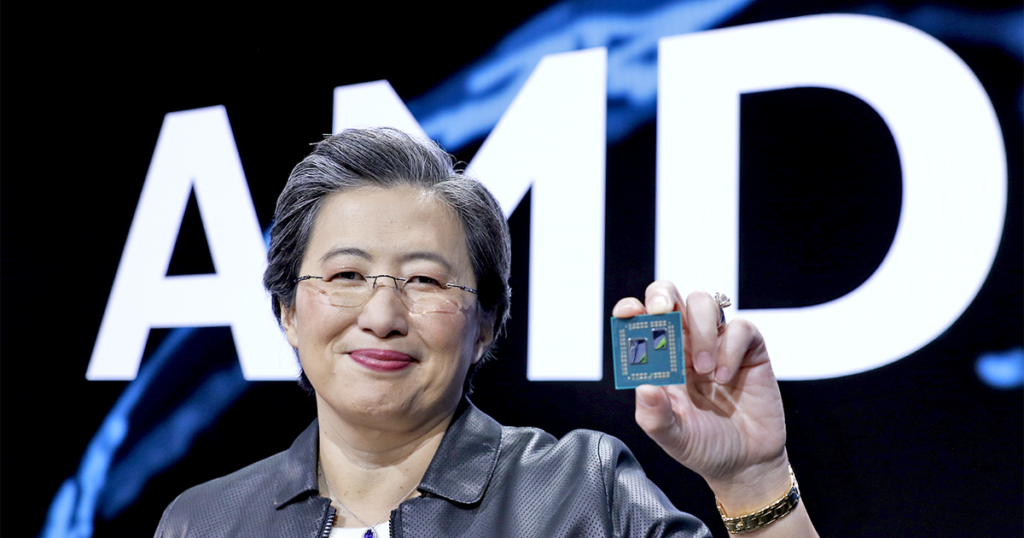|
Getting your Trinity Audio player ready...
|
Advanced Micro Devices (AMD) has introduced its latest artificial intelligence chip, the MI300X, as part of its ongoing competition with chipmaker Nvidia in the booming AI-driven business tools sector. The California-based semiconductor company claims that the MI300X is “the world’s most advanced accelerator for generative AI.” While the chip is expected to garner interest from major cloud providers like Amazon and Microsoft, AMD has not disclosed specific details about potential partnerships.
Angelo Zino, the senior equity analyst at CFRA, recently predicted that AMD’s MI300 processor will attract significant attention from cloud providers and rival Nvidia’s Grace Hopper Superchip. Zino also highlighted AMD’s closer collaboration with Microsoft, suggesting that the company is working on a custom processor chip for AI workloads to be used by the tech giant.
At a showcase event in San Francisco, AMD CEO Lisa Su demonstrated the capabilities of the new technology. By introducing the MI300X, AMD joins a growing list of technology companies aiming to tap into the rising demand for AI tools that can analyze data, aid in decision-making, and potentially replace certain human-performed tasks. The focus is particularly on “generative AI” tools, such as ChatGPT, which can produce written works, images, computer code, and other media upon command.
Nvidia, another Santa Clara-based company, has established itself as the leading provider of AI chips, encompassing specialized computing hardware designed for AI system training using vast amounts of data. Nvidia’s dominance in the market has contributed to its status as one of the world’s most valuable companies, recently surpassing a trillion-dollar valuation after forecasting substantial revenue growth driven in part by AI-focused chip sales.
The competition between AMD and Nvidia in the AI chip space highlights the rapid expansion and immense potential of the AI market, as businesses increasingly seek innovative tools to analyze data and enhance their operations. With both companies pushing the boundaries of AI technology, the industry can expect further advancements and breakthroughs in the near future.
As the rivalry between AMD and Nvidia intensifies, experts anticipate that the competition will spur further advancements and breakthroughs in the AI chip sector in the near future. The demand for AI-driven technologies continues to soar as businesses across various industries recognize the transformative potential of AI in enhancing productivity, efficiency, and decision-making processes.
Both AMD and Nvidia are investing heavily in research and development to push the boundaries of AI chip capabilities. The race to develop more advanced and efficient chips is driven by the need to handle increasingly complex AI workloads and cater to the evolving requirements of businesses and developers. These advancements may include improved performance, energy efficiency, and scalability, enabling the development of more sophisticated AI applications.
The growing interest from cloud providers, such as Amazon and Microsoft, underscores the significance of AI chips in powering cloud-based AI services and applications. Cloud providers require high-performance hardware to handle the immense computational demands of AI workloads and to deliver seamless user experiences. The competition between AMD and Nvidia in securing partnerships with these cloud giants will likely drive further innovation and optimization of AI chip architectures.
Moreover, the focus on generative AI tools, like ChatGPT, highlights the potential for AI to generate content autonomously, which has implications across various creative fields. With the ability to produce written works, images, and computer code, generative AI tools have the potential to revolutionize content creation, automation, and personalization.
As the AI market continues to evolve, it is expected that other players in the semiconductor industry will also join the race, further fueling innovation and competition. This dynamic environment will benefit businesses and consumers by offering a wider range of AI tools and driving down costs.
Overall, the competition between AMD and Nvidia in the AI chip market promises a future marked by continuous advancements, breakthroughs, and transformative applications of AI technology. As these companies push the boundaries of what is possible, businesses and society as a whole stand to gain from the incredible potential of AI-driven tools and solutions.



